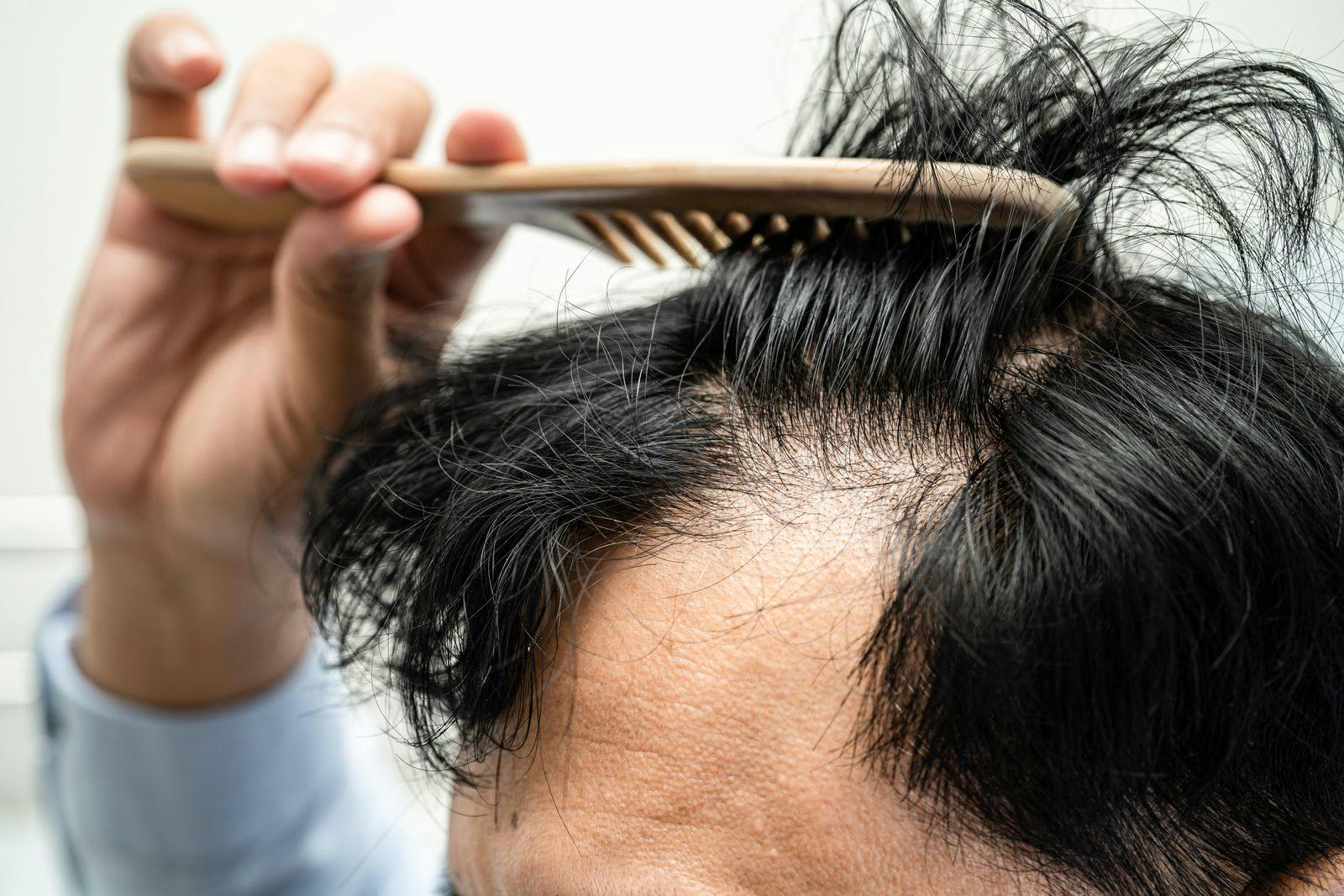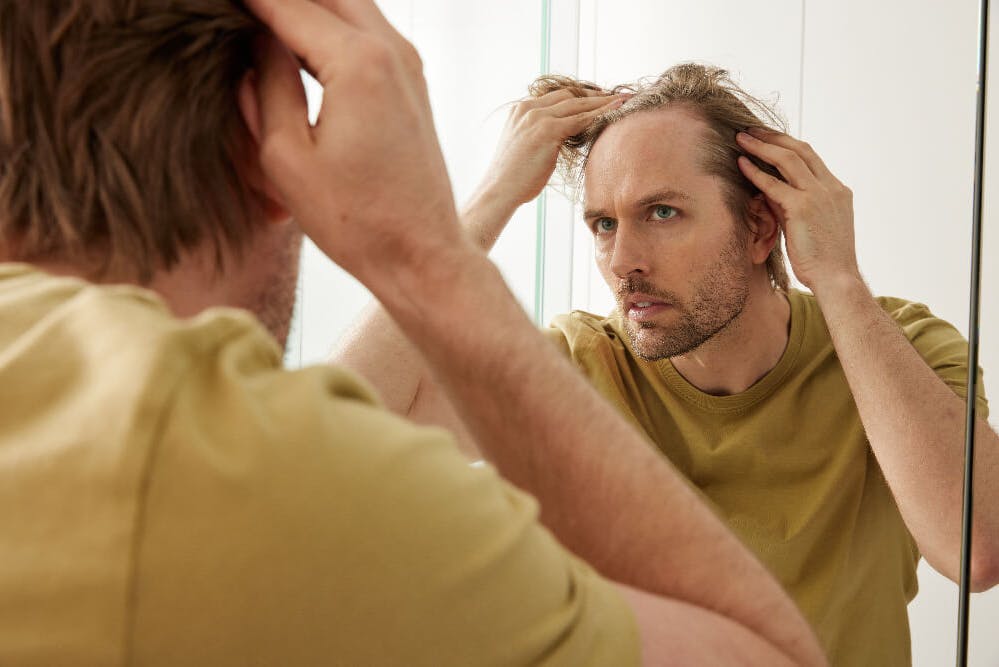


Is your hairline starting to recede? If so, you're not alone. Male pattern baldness, also known as androgenetic alopecia (AGA), affects up to 50% of men globally [1]. But what causes this common form of hair loss, and does it really come from your maternal grandfather?
In this article, we’ll explore the genetic factors influencing hair loss and debunk some myths about the baldness gene origins.
When hair loss is primarily driven by genetics, it tends to follow characteristic patterns — known as male pattern baldness (MPB) or female pattern baldness (FPB) — distinguished by where and how hair thins over time.
For men, male pattern hair loss or MPB often begins with a receding hairline at the temples, forming an M-shaped pattern, and may progress to thinning at the crown. This type of hair loss can start as early as the 20s or 30s, with studies showing that 80% of men experience some degree of MPB by the age of 80 [2].
The medical term for both MPB and FPB is androgenetic alopecia, and it is the most common cause of hair loss worldwide. Research into twins has revealed that genetic prediction of male pattern baldness accounts for about 80% of the likelihood of developing MPB, underscoring the importance of hereditary factors [2]. However, hormonal changes, particularly related to androgens, and lifestyle factors such as stress and nutrition also play critical roles in the development and progression of hair loss.
It’s a common myth that baldness is inherited solely from your maternal grandfather, but this isn’t entirely accurate. While there is some truth to the idea that male pattern baldness is influenced by genes on the X chromosome inherited from your mother, this is only part of the story.
The genetics of MPB are complex and thought to be polygenic, meaning that multiple genes are involved rather than a single dominant gene. Everyone has 23 pairs of chromosomes, with one pair — the X and Y chromosomes — determining biological sex. Men inherit their X chromosome from their mother and their Y chromosome from their father [3].
The androgen receptor (AR) gene, located on the X chromosome, is strongly associated with male pattern baldness [4].
Research involving over 12,000 men of European ancestry found that those with certain variations in the AR gene were more than twice as likely to experience MPB [5].
However, this isn’t the only gene involved in baldness. A 2017 review identified 63 genetic variants linked to male baldness, with only six of these found on the X chromosome [6]. The majority of these genes are located on autosomal chromosomes, meaning both parents can pass on the genetic predisposition for hair loss.

Despite the focus on maternal inheritance, the idea that male pattern baldness is a polygenic trait is supported by research conducted in Australia, which examined the occurrence of baldness in the fathers of balding men. In this study, researchers found that 81.5% of sons who experienced significant hair loss had fathers who also exhibited cosmetically noticeable baldness [4].
This evidence underscores the strong genetic link between paternal hair loss and the likelihood of sons inheriting the trait, further supporting the polygenic nature of the condition, suggesting that paternal genes are equally important in determining whether and how severely you will lose your hair.
The extent and pattern of male-pattern baldness can vary greatly depending on genetic factors. These determine whether an individual will experience:
These genetic predictions can help individuals anticipate their likelihood of experiencing hair loss, which could lead to more personalised treatment options.
Although genetics are the primary driver of male pattern baldness, hormones and lifestyle choices also play critical roles in influencing hair loss.
In the 1950s, significant advancements were made in understanding the relationship between testosterone and hair loss, particularly through the work of researchers like Dr. James Hamilton [4]. Early studies indicated that men who were castrated before puberty did not experience hair loss, supporting the idea that androgens like testosterone are necessary for the development of male pattern baldness. Variations in this gene increase hair follicle sensitivity to testosterone and its derivative, dihydrotestosterone (DHT), which leads to hair thinning and baldness.
Several lifestyle factors are linked to hair thinning and pattern hair loss:
With a better understanding of the genetics of male pattern baldness, researchers are developing more targeted therapies.
Current treatment options include:
Genetic testing may also soon allow for earlier identification of individuals at risk of androgenetic alopecia, leading to more proactive and personalised interventions.
The causes of male pattern baldness go beyond the old wives' tale about maternal grandfathers. Both paternal and maternal genes contribute to the genetic architecture of MPB, along with hormones and lifestyle factors. While you can’t change your genetic predisposition, there are ways to address hair loss proactively.
From adjusting your diet and managing stress to exploring treatments, there are multiple ways to maintain healthy hair. If you're concerned about early-onset androgenetic alopecia, consulting a dermatologist or trichologist can offer personalised insights based on your genetic risk and lifestyle factors.
At Mosh, we specialise in personalised hair loss treatments, designed specifically for men experiencing male pattern baldness. Our telehealth consultations connect you with experienced doctors who can assess your condition and recommend effective hair loss treatments, our range of scientifically proven haircare products is tailored to help you slow down hair loss and maintain the health of your scalp and follicles.
Whether you choose to combat hair loss or embrace a bald look, confidence is your best accessory. At Mosh, we're here to help you feel your best, no matter which path you take.
Explore our hair loss solutions, take the quiz or book a consultation today to take control of your hair health.












Ready to Treat Hair Loss?